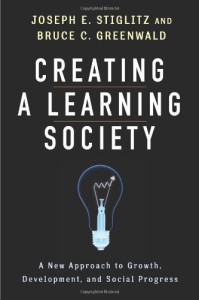
Joseph Stiglitz, Bruce Greenwald
4.0 out of 5 stars Glass Half Full — Cannot Be Ignored But Also Off the Rails, September 4, 2014
Among all economists in the English language, I hold Joseph Stiglitz to be among the most enlightened and virtuous. When I formed a “dream” coalition cabinet in 2012, he was on it. His co-author is of less interest to me — finance geeks have been demonstrably impotent these past fifty years — and particularly those who fall prey to mathematical formulas lacking in social integrity — and I believe with book would have been stronger had Stiglitz either gone it alone, or collaborated with an educator such as Derek Bok. The book is also rooted in old lectures, starting in 2008, and it is focused on Kenneth Arrow's work, which is best appreciated on its own merits. See, for example:
Moral Hazard in Health Insurance (Kenneth J. Arrow Lecture Series)
The Limits of Organization (Fels Lectures on Public Policy Analysis)
General Competitive Analysis, Volume 12 (Advanced Textbooks in Economics)
The weakest point of this book, which does indeed have much to offer for anyone who cares about the future of academia, commerce, governance, and society, is that is “assumes” integrity on the part of the government, and that industrial policies are somehow going to corrupt deep ethical and intellectual failings across all major forms of organization (academia, civil society, commerce, government, law enforcement, media, military, and non-governmental/non-profit). This is the same mistake made by Limits to Growth: The 30-Year Update and the Club of Rome. The *losing* alternative to the Limits to Growth assumption that top-down government would deal responsibly with climate change and other high level threats focused instead on education from the bottom up — the central point of Will Durant's 1919 doctoral thesis, now available as Philosophy and the Social Problem: The Annotated Edition.
I have published an online slide show of my Amazon reviews in this area, easily found by searching for the title, < Robert Steele: Online Review Books on Education, Intelligence, Research >, and for me the bottom line is clear: holistic education and a grasp of true cost economics such as championed by Herman Daly in Ecological Economics, Second Edition: Principles and Applications are the foundation for a learning society, *not* economists and financial mathematicians (the worst possible juxtaposition).
The book's attention to the perversion of intellectual property laws and the need for more attention to open source technologies is constructive but insufficient. The avant guarde now seems to understand that open source is a meme and a mind-set and that only an “all in” approach embracing ALL of the opens will do. I am off to London soon to help create an Open Source Everything Innovation Hub at a great university, precisely because I could not get MIT, George Washington University, or the University of Maryland, among others, to break with corrupt legacy constructs and think truly big thoughts. Richard Stallman, Linux Torvalds, and Lawrence Lessig, among others, remain heroes of mine, and I commend their varied works to readers of this review.
On a most positive note, while this book glosses over the great crimes of both government (e.g. 935 Lies: The Future of Truth and the Decline of America's Moral Integrity) and banking (e.g. Griftopia: A Story of Bankers, Politicians, and the Most Audacious Power Grab in American History), it is a helpful venture by an economist I regard very highly, into the foreign territory of integral consciousness and consilience. Mathematical formulas are an annoying waste of time at this level of thinking, and I hope that Stiglitz will in the future connect to the humanities — I would recommend starting with E. O. Wilson's Consilience: The Unity of Knowledge and Steve MacIntosh's Integral Consciousness and the Future of Evolution.
Best wishes to all,
Robert David STEELE Vivas
THE OPEN SOURCE EVERYTHING MANIFESTO: Transparency, Truth, & Trust




